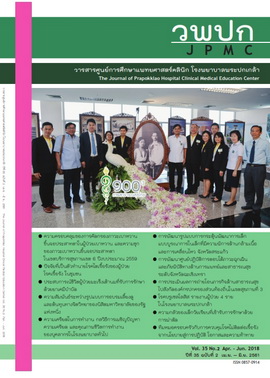The Life Experiences of Breast Cancer Patients who Received Chemotherapy
Main Article Content
Abstract
Background: Cancer is still a major public health problem. Modern medicine doctors provide many kinds of treatment such as surgery, hormonal therapy and chemotherapy, which is important and currently popular treatment method but in some cases it can have severe side effects.
Objectives: It aimed to study the ways of thinking about illness and the life experiences of breast cancer patients who received chemotherapy at Mahasarakham Hospital.
Materials and methods: This phenomenological qualitative research was conducted from July 2015 to September 2016. The 8 informants included breast cancer patients, aged 40 years old and older, who were admitted to a general surgical ward and received chemotherapy at Mahasarakham hospital. The data were collected using the participatory observation and in-depth interview; then, it was analyzed using thematic analysis.
Results: The way of thinking about the illness of breast cancer patients receiving chemotherapy were expressed in 5 different ways and they are as follow: 1) feeling excited, fear and shock; 2) battling for recovery; 3) expecting recovery; 4) letting it be and 5) being able to get over it. The life experiences of breast cancer patients who received chemotherapy comprised of 2 main points: 1) the physical-psychosocial care and 2) the need of help in various facets which makes the society aware of such problem and need.
Conclusion: The results can be useful in developing good clinical nursing practice guidelines for cancer patients receiving chemotherapy at the hospital in the future.
Keywords: life experience; breast cancer; breast cancer patient; chemotherapy
Article Details
References
2. WHO Media Center. Cancer [Internet]. 2017 [cited 2017 Sep 23]. Available from: https://www.who.int/mediacentre/factsheets/fs297/en/
3. Bureau of Non Communicable Disease, Department of Disease Control, Ministry of public health. Annual report 2015 [Internet]. 2017 [cited 2017 Oct 14]. Available from: https://www.thaincd.com/document/file/download/paper-manual/Annual-report-2015.pdf
4. National Cancer Institute. Hospital-based cancer registry annual report 2014. Bagkok: National Cancer Institute, Department of Medical Service, Menistry of Public Health Thailand; 2014.
5. Thai Society of Clinical Oncology (TSCO). Get to know chemotherapy [Internet]. 2016[cited 2016 June 21]. Available from: https://www.thethaicancer.com/Webdocument/People_article/People_article_002.html
6. General Surgery Ward. Illness statistic of general surgery ward 2014-2015. Mahasarakham: Mahasarakham Hospital; 2015.
7. Buranaruangrote S, Kasemkitwattana S, Keerativitayanant N, Pongthavornkamol K. Experience and self management for fatigue in breast cancer patients receiving chemotherapy. The Thai Journal of Nursing Council2006; 21(2): 47-62. 8. Malangpoothong R, Pongthavornkamol K, Sriyuktasuth A, Soparattanapaisarn N. Symptom experiences, management strategies and functional status in advanced lung cancer patients receiving chemotherapy. J Nurs Sci 2009; 27 (2):69-78
9. Phuansuk W. Uncertainty in Illness of breast cancer patients receiving chemotherapy in Bangkok Christian hospital. Nakhon Pathom: Christian University of Thailand; 2553.
10. Pothisita C. Science and art of qualitative research. 2nd ed. Bangkok: Amarin Printing & Publishing; 2016.
11. Speziale HJ, Carpenter DR. Qualitative research in nursing: advancing the humanistic imperative. 4th ed. Philadelphia: Lippincott Williams & Wilkins; 2007.
12. Chula cancer, Radiation Oncology Department, King Chulalongkorn Memorial Hospital. Chemotherapy [Internet]. 2017 [cited 2017 Aug 9]. Available from: https://www.chulacancer.net/patient-list-page.php?id=323
13. Phligbua W, Pongthavornkamol K, Knobf MT, Junda T, Viwatwongkasem C, Srimuninnimit V. Symptom clusters and quality of life in women with breast cancer receiving adjuvant chemotherapy. Pacific Rim Int J Nurs Res 2013;17:249-67.
14. Juangpanich U, Tawalee A., Knasen S, Suguman S. Development of self-care agency model in cholangiocarcinoma patients receiving chemotherapy. Rama Nurs J 2006; 12:49-66.
15. Poonsamer O, n Wirojratana V, Jitramontree N, Thosingha O. The relationships between knowledge of chemotherapy treatment, skills of self-care, social support and well-being during transition among older patients with cancer receiving chemotherapy. Journal of The Royal Thai Army Nurses 2014; 15(2): 368-77.
16. Paointhr T, Rungwang Y, Tiasakul R. Quality of life among the breast cancer patients receiving modified radical mastectomy (MRM) and chemotherapy. Journal of Health Science 2010; 4(1): 28-37

